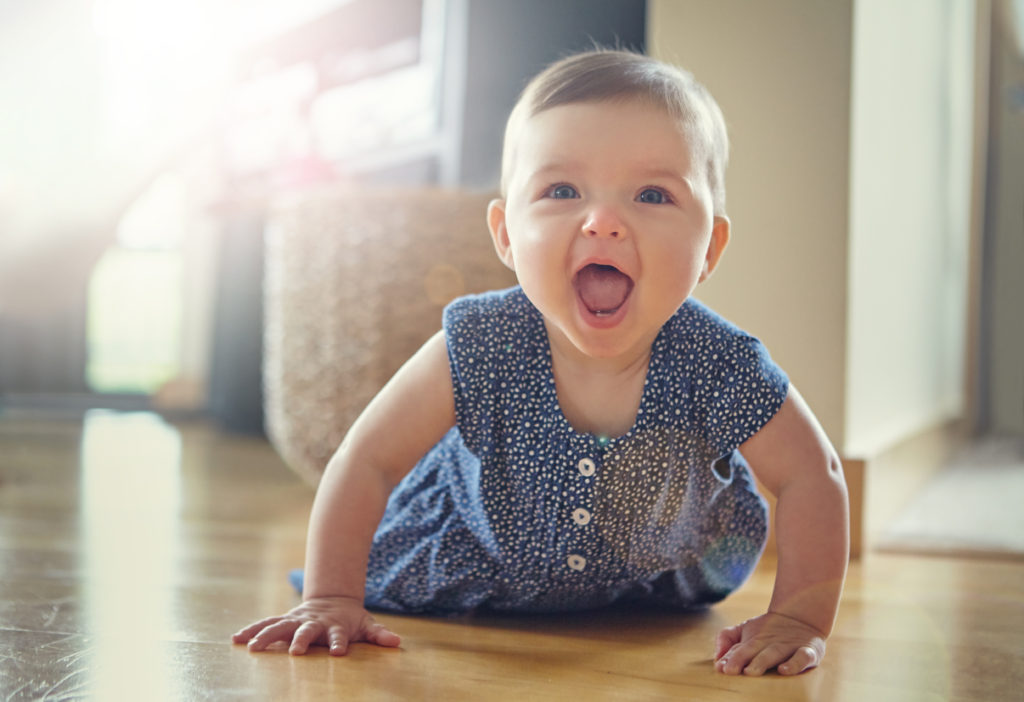6-12 Months

Watching your baby grow into a toddler is one of the most fascinating stages of their childhood. As your baby approaches his/her first birthday, they’ll make some huge leaps towards becoming a walking, talking toddler with plenty of attitude. In the months leading up to the incredible milestone of your baby taking their first steps, you’ll also notice them learning to talk, play and interact with the world in a more ‘grown-up’ way as he or she starts to leave the baby stage behind.
If your baby is creeping at six months (shunting themselves along on their tummy), it’s a sign that he/she’s going to be an early crawler and walker. Encourage them by giving them lots of playtime on their tummy which helps strengthen abdominal and back muscles in preparation for becoming mobile.
Most babies learn to crawl between seven and ten-months-old. This is an exciting time for parents, but also potentially quite stressful because, once your baby is on the move, you’ll have to watch him/her constantly and be on the lookout for potential hazards. The more you babyproof your home, the more relaxed you will feel as your baby becomes mobile.
Lots of babies find their voice around now and start to babble away to themselves and ‘shout’ for attention rather than cry. Your baby may also experiment with sounds, making high and low-pitched noises. Responding to your baby’s babble is fundamental to them learning to speak. If you smile and talk back when your baby ‘says’ something, he/she’ll be more likely to ‘say’ it again.
Your baby’s understanding will increase this month and he/she will follow a lot of what you say if it concerns them. For example, you could be discussing their rice cakes with someone else and your baby may suddenly sit forward and squeal because he/she wants one. Make a point of chattering away to your baby because this is crucial to their language development.
Your baby is old enough to start learning how to clap and wave, so spend a little time teaching them these fun skills. He/she may also start to nod and shake their head this month to express ‘yes’ and ‘no’ when you ask questions like: ‘Do you want a drink?’.
Lots of babies will pull themselves up to standing for a few wobbly seconds this month. You can’t speed up how quickly your baby stands and walks, but a sign that he/she isn’t far off is when his/her feet are flat on the floor – rather than curling – when you hold them in the standing position. Some babies at this age are able to make animal noises, and a few will be able to say a couple of words.
At this stage, your baby is old enough to start throwing, so when he/she chucks her lunch across the room it’s not personal, she’s just delighting in her new found skill.
The average age for babies to learn to walk is between 12 and 15 months, so your little one may be taking their first steps before long. Even if they’re a late talker, their understanding gets significantly better around now and you’ll be able to give them simple instructions such as, ‘say bye-bye’ and they may wave. You can also ask her to ‘clap hands’, ‘push the train’, ‘pick up teddy’, and so on.
Some babies are able to hold a crayon and make a few faint scribbles – from now on you’ll need to watch out for your baby getting hold of pens and marking the walls. Your baby may also be capable of the early stages of fantasy play – pretending to feed their teddies, holding a phone to their ear, or pretending to eat toy food.
At the amazing milestone of 12 months, your baby will be well on the way to toddlerhood. By their second birthday, your baby will be chatting, running, climbing and even arguing. Enjoy!
